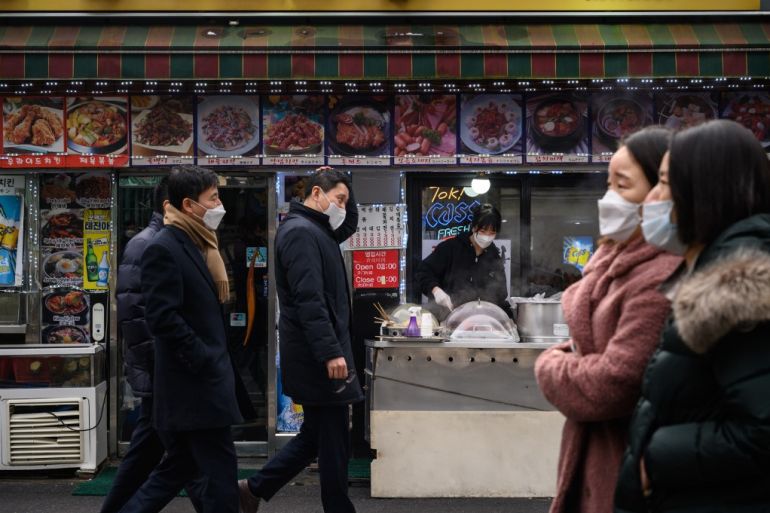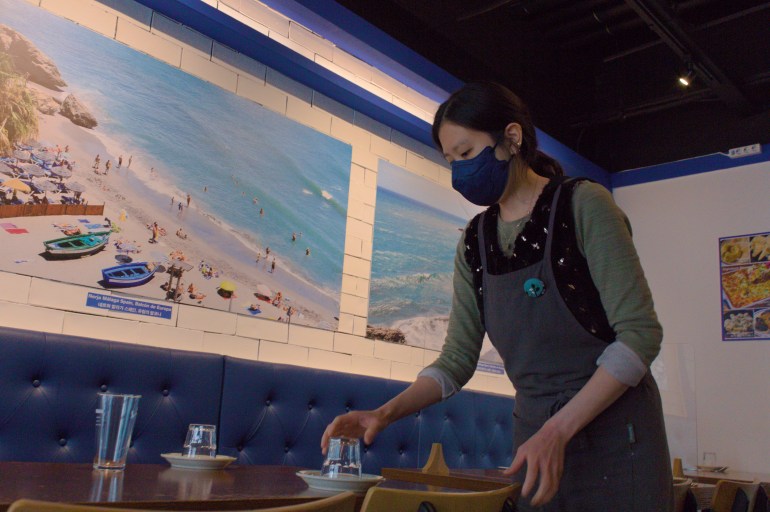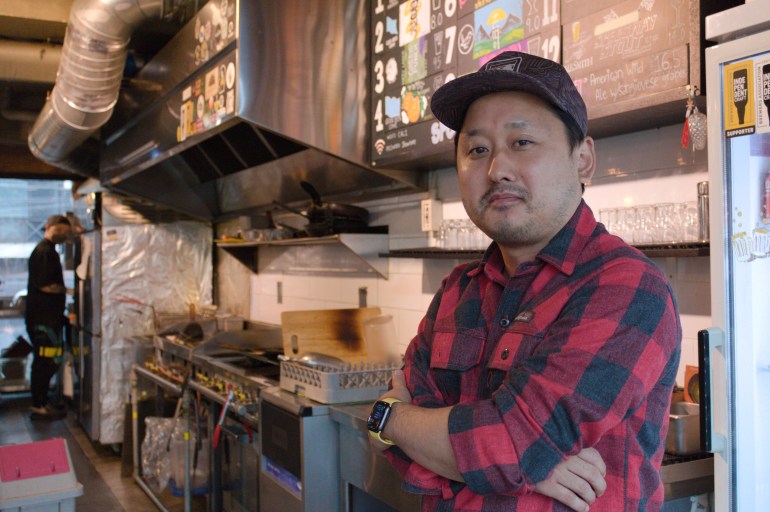South Korea’s restaurants despair amid ‘living with COVID’ U-turn
Authorities have reintroduced restricted hours for restuarants, cafes and bars amid a surge in COVID-19 cases.

Seoul, South Korea – Only weeks after South Korea launched its “living with COVID” drive to return to normal life, small business owners like Lee Kyuna are feeling the pressure all over again.
From Saturday until at least January 2, Lee will be forced to close her restaurant by 9pm each day under a business curfew introduced to blunt a record surge in coronavirus cases.
Keep reading
list of 4 itemsBiden warns of ‘winter of illness, death’ for US unvaccinated
Endless pandemic? Asia’s Omicron retreat shows COVID is political
Asia misses global recovery of air travel, as IATA blasts bans
The owner of Kantina, a restaurant in a quiet residential area of Seoul, is still recovering from the impact of the last round of restrictions, which only lifted on November 1.
“The revenue says it all – 40 percent drop,” Lee told Al Jazeera. “Seriously. Normally I would have customers until 12 or 1am on Fridays and Saturdays. But that just all stopped.”
Lee’s restaurant is among the 2.7 million small businesses in South Korea feeling the pain of pandemic restrictions, the latest of which includes a curfew for restaurants, cafes, bars and cinemas, and a ban on private gatherings of more than four people.
Although South Korea’s economy has weathered the pandemic better than many of its peers – growing an estimated 4 percent in 2021 on the back of strong exports and rebound of the global economy – mom-and-pop businesses have been hit with repeated rounds of restrictions on their business hours.

In September, business owners took to the streets to protest the curfews and restrictions, which organisers said had resulted in the permanent closure of 453,000 businesses during the pandemic.
Nine-ninety percent of enterprises in Korea are considered small and medium businesses, employing 83 percent of the workforce, according to the Ministry of SMEs and Startups.
The latest restrictions come despite South Korea having one of the world’s highest vaccination rates, with more than 80 percent of the total population doubled-jabbed.
Chuck Chun, who runs an American-style restaurant in central Seoul, told Al Jazeera the business environment had forced him to adjust plans to open an outlet at another location.
“We ended up opening up another restaurant as a delivery kitchen, that was our pivot,” Chun said. “When we have less in-house customers here, the deliveries there go up, but it never makes up for people actually coming in.”
“People stay here a few hours, and they drink, and they eat, and they continue to drink,” Chun added. “We’re losing out on all of that business. And on top of that, we’re paying a 30 percent, fee [on deliveries], so yes, it’s helpful, because it’s helping us keep our head above water. But it’s not worth it.”

Minister of SMEs and Startups Kwon Chil-seung announced on Friday that businesses affected by the latest rules would be eligible for payments of 1 million Korean won ($840) each by no later than February.
The financial support comes on top of billions of dollars the government has already spent on pandemic relief, including a 310 trillion won ($261.59bn) package last year that included low-interest loans and emergency grants for small businesses.
“Everybody is expecting a gloomy New Year, we’re expecting a lot of civil complaints about getting paid,” a spokesperson for the Ministry of SMEs and Startups told Al Jazeera.
“Some might not be satisfied, but the amount will be higher than last time.”
Lee Doo-won, a macroeconomy professor at Yonsei University, told Al Jazeera the economy was feeling the strain despite relatively strong gross domestic product (GDP) figures on paper.
“After the vaccination program began early this year, the number of infected people decreased rapidly. So, there was a fairly optimistic view about consumption and investment,” Lee said.
“But then we had the Delta variant sometime in the middle of this summer and then another one, the Omicron variant. So, consumption is not picking up as fast as we expected.”
‘Sinking boat’
For Lee, the restaurant owner in Seoul, the latest restrictions have left her considering her options if her business goes under.
“I will have to think of a plan B or C,” she said. “Maybe get my deposit back from my apartment and live with my parents again. It could be any day really if I try plan B and it doesn’t work, in the next months I’ll move in with them.”
While Lee is angry, she hopes to redirect that energy in a positive direction after switching up her menu from Japanese-style chicken, which mostly attracted late-night revellers, to Mediterranean food.
“I wanted to cook and serve people what I’m really enthusiastic about and what I’m passionate about, and my passion was in Mediterranean food,” she said. “The pandemic kind of gave me the opportunity to do something that I really like. I had to kind of find something that I could pursue and put my energy on instead of just be a sinking boat.”